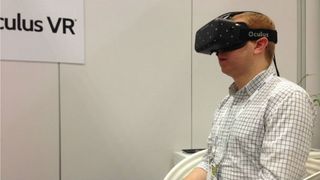
Less than two years ago, we were describing the Oculus as something that began as a “garage project.” Today, Facebook has bought Oculus VR for $2 billion in stock and cash, surprising all and horrifying some. Here in the PC Gamer office, we all have our own theories and thoughts on what Facebook's involvement means for the future of VR gaming—and how the deal will impact PC gaming as a whole. Here are our reactions to the Oculus purchase, written shortly after the deal was announced.
Evan: I'm worried about what it means that a massive, data-eating conglomerate is going to absorb an experimental, PC-focused indie darling (that admittedly had already received almost $100 million total through venture capital funding and Kickstarter). We've admired Oculus' independent spirit from the earliest prototype stage of its device. What will happen when a weird, specialized gaming peripheral that's been used to create everything from space exploration games to Seinfeld simulators is exposed to the enormous, corporate, billion-dollar expectations of the world's biggest social network?
There is an upside: Facebook's ubiquity could actually catalyze adoption of the Rift by developers and consumers. Think of it this way--part of the reason a niche grand strategy game like Europa Universalis IV can be commercially successful is that it's exposed to a big pool of 75 million monthly active users on Steam. If Facebook's ownership and scale (1.2 billion active users) is what allows Oculus to become a proper platform where a wide variety of games and content and experiences can exist--great. Along these lines, it's encouraging to see Palmer Luckey write on Reddit that there will be “very little changes day-to-day at Oculus, although we'll have substantially more resources to build the right team.”
Tim: Between the new Oculus dev kit and Sony's Morpheus reveal, last week's Games Developer Conference obliterated any lingering doubts over how important virtual reality is going to be. Facebook ponying up the thick end of $2bn in cash and stocks to acquire Palmer "Lucky" Luckey's startup only confirms it. My suspicion is that VR is potentially the biggest single step-change for gaming since the shift to 3D graphics. To try the Rift is to believe in VR. More than that, it's to understand that this tech is transformational, with arguably even more mainstream appeal, and possible applications, than motion control had. No wonder the world's biggest tech firms are jockeying for first mover position in the home VR space, and no wonder they're willing to pay big for a leg up.
But what does it mean for us as PC gamers? Part of what we've loved about the Rift so far is that it already feels part of our ecosystem. It's powerful but scrappy. It's innovative but it sure ain't pretty. And crucially, it's open, with a raft of fascinating demos already available to try, as evidenced by Andy's new weekly Rift Report column. The contrast with Facebook's current reputation in the gaming space couldn't be clearer: cynical, rapacious, unloved. So of course there's going to be understandable doubts now about whether the original vision for Rift will be co-opted into something blander, more marketable.
As with the WhatsApp acquisition , the right noises about independence are being made loud and early. And the potential exposure to a far wider audience will make Rift a far stronger platform in the longterm. But here's what I really think: We shouldn't be scared about VR being taken away from core games and into more casual territory. Games will come because they always do on any interesting, powerful, platform. But when I think about VR, I also get excited about the entertainment and (whisper it) education possibilities. Imagine being able to be there in Texas on the day JFK was shot, watching it play out from multiple vantages. How many other historical moments would you like to relive? And what might it mean for Hollywood storytelling? Couldn't you envisage experiencing the spectacle of a movie like Pacific Rim from the inside? I think Facebook knows that developers and content creators have barely started thinking about this sort of stuff, but when they do the results are likely going to be incredible. Facebook isn't just buying a company. It's buying the chance to bottle lightning again.
Tyler: As Evan and Tim express, Facebook isn't exactly the logo I want strapped to my face, tracking my movements. The most important thing for me is that the Rift remains an open platform. I think it will—licensing and exclusivity are potential revenue streams, but limiting the number of developers who can work with an experimental system isn't the way to get it off the ground. Oculus has already proven how effective the opposite approach is.
PC Gamer Newsletter
Sign up to get the best content of the week, and great gaming deals, as picked by the editors.
The good news is that virtual reality has gone from a Kickstarter dream to serious business. I hope the first Oculus Rift consumer version turns out better than it would have otherwise, and comes out sooner. I hope Facebook's PR and marketing machine results in wider adoption and faster advancement. And beyond games, I'm all for virtually attending sporting events and meeting with friends in cyberspace. It's the stuff of science fiction (which, admittedly, has mostly been warning us about it), and something I fundamentally want.
So, it's a mixed reaction, but let's not jump to conclusions or declare Oculus “dead.” I think we'll see a net positive from this deal. Even if Facebook somehow manages to turn the Oculus Rift into a ViewMaster that cycles ads for mystery diet supplements, this investment says to the world: VR works and will get better. There will be competitors, and if Facebook has made the right bet, a potentially huge industry built on virtual reality technology and software.

Cory: The mind reels at the reasons why Facebook and Oculus are hooking up. You can make up all kinds of theories: Oculus needed the cash to make manufacturing deadlines, and Facebook basically prints money (well, not really but go with me). Oculus is straight up worried about the progress Sony has made with its Project Morpheus headset, and wants some mainstream muscle behind the Rift's commercial launch. Or maybe Palmer Luckey and Mark Zuckerberg really, really hit it off while having tacos in Menlo Park.
I think maybe the most interesting part of this news isn't what Oculus gets out of this partnership--and it gets a lot, to be sure--but what Facebook gets. Here's a company that hit Wall Street just two years ago and hasn't made a name for itself in terms of what investors want. What better way to do that than to create an honest-to-god consumer product? It tried to make a phone OS, but that hasn't gone anywhere. With the Rift, Facebook can say that it's gone from being a data company or an advertising company to a group that actually makes tangible stuff.
In the meantime, what happens to virtual reality? Luckey told me at CES 2014 that gaming is just the early adopter audience for the technology--that industries such as health care and architecture and engineering will jump on the VR bandwagon as soon as gamers figure out how to explore their worlds with it. Facebook clearly sees an even broader appeal to the technology. Here's what Zuckerberg had to say :
“After games, we're going to make Oculus a platform for many other experiences. Imagine enjoying a court side seat at a game, studying in a classroom of students and teachers all over the world or consulting with a doctor face-to-face--just by putting on goggles in your home.”
That's some bold, forward-looking PR speak, to be sure, but it's the kind of ambition you'd expect for both the most exciting technology in the world and one of the biggest startups in history.
My favorite part of Facebook's announcement is that the company will stay out of Oculus' way as it moves to release the consumer version of the Rift for PC gamers. That's important: it means that the initial vision of virtual reality for our games can happen unfettered. I like to think Zuckerberg's team is looking past that, at what VR can do for the mainstream, with us gamers as the testing bed. That's kind of a cool feeling.
Hey folks, beloved mascot Coconut Monkey here representing the collective PC Gamer editorial team, who worked together to write this article! PC Gamer is the global authority on PC games—starting in 1993 with the magazine, and then in 2010 with this website you're currently reading. We have writers across the US, UK and Australia, who you can read about here.
Most Popular





